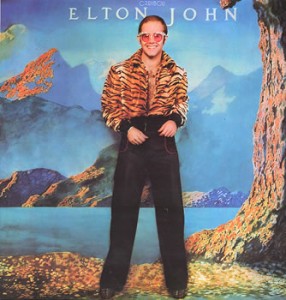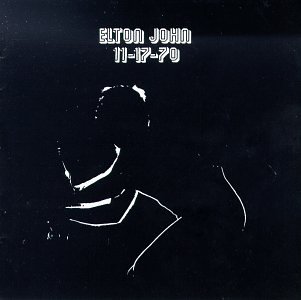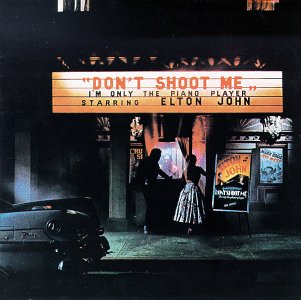
A Heavily-panned Record At Its Time, “Caribou” Now Proves To Be A True Gem Within Elton’s Catalog.
Quite probably one of Elton’s most underrated albums, “Caribou” was released in 1974, and in hindsight it is easy to understand why it collided with such a wall of negativity. The record ended up sandwiched between two magnum opuses like “Goodbye Yellow Brick Road” (1973) and “Captain Fantastic & The Brown Dirt Cowboy” (1975). If you listen to it now, it dawns on you that the material was not really substandard (despite the fact that the whole album was recorded in about a week), and the hits it yielded (the irresistible, horn-augmented rocker “The Bitch Is Back” and the powerful ballad “Don’t Let The Sun Go Down On Me”) were representative of the quality of the whole disc, not songs that were labored at longer knowing they were going to be “the” singles (as would happen often during the ‘80s).
“The Bitch Is Back” (whose title was inspired by a remark made by Bernie’s wife Maxine) will always stand as one of Elton’s most driving rockers, not only on the strength of the main riff but also because of the accompaniment provided by the Tower Of Power horns, a new American association Elton had made. (“Caribou”, incidentally, was the first album he recorded in the US.) The Tower of Power horns were also going to be exemplary on “You’re So Static”, a misogynistic song about a prostitute that prefers to have her client’s watch rather than money for the rendering of her professional services. The coalition between the pounding horns and the swirling organ during the choruses make the song stand out, and the bluesy “Stinker” (although clearly not a highlight) is also enjoyable on grounds on the TOP contribution. Otherwise, “Stinker” sounds too much like a thematic retake on “Midnight Creeper”, and we already have “The Bitch Is Back” here to begin with.
The country interlude of the album comes in the shape of “Little Dixie”. The song is better than “No Shoe String On Louise” but still far from fulfilling – it would take Elton more than two decades to come up with stuff like “Birds” and “Turn The Lights Out When You Leave”. The best part of “Little Dixie” might as well be the sax solo, provided (again) by a member of TOP.
But “Caribou” saw the addition of another top-notch musician to Elton’s ranks aside from the Tower Of Power horns. I am talking about percussionist Ray Cooper, who made his debut on “Caribou”, and who was to become one of the most-revered bit-players associated with Elton outside of those who made up the “classic” band. Some ‘80s and early ‘90s tours comprised only Elton and Ray – that was the case of Elton’s Russian tour (he was the first rock and roll performer to play there), and also of Elton’s first visits to South America. His first show here in Uruguay had people shouting for Cooper over Elton, much to Elton’s amusement – they played the Estadio Charrúa and people stood up cheering “¡Pelado! ¡Pelado! ¡Pelado!” [¡Baldy! ¡Baldy! ¡Baldy!]. Continue reading


